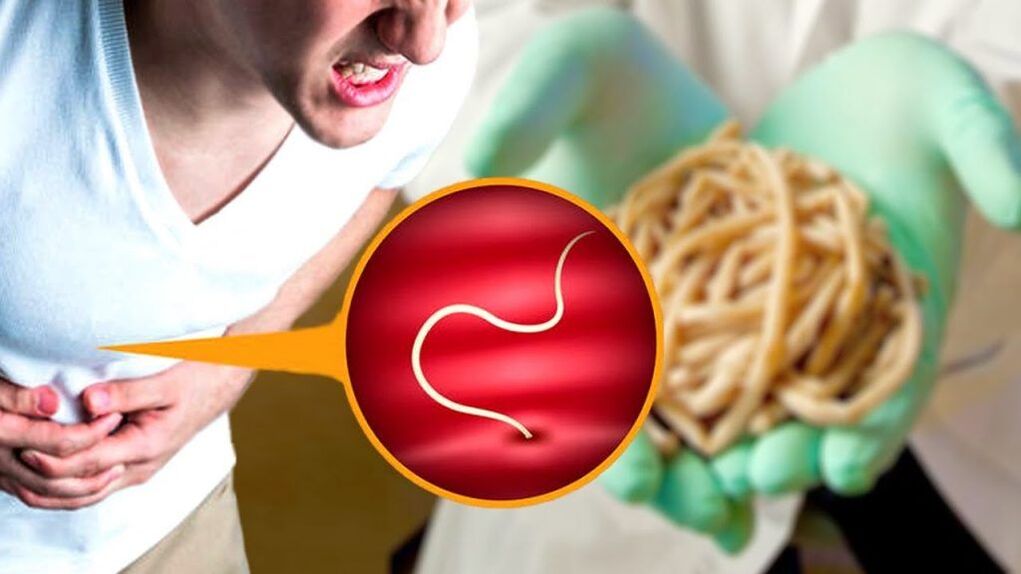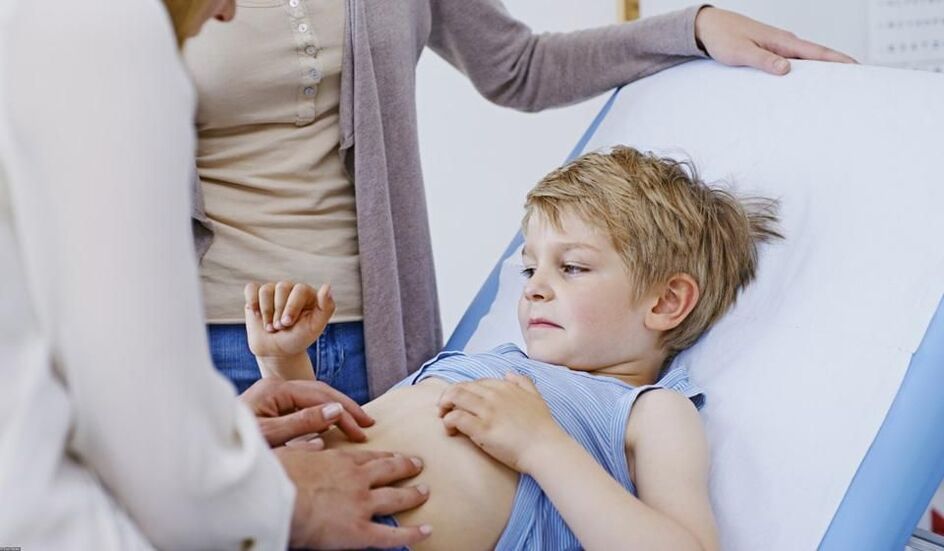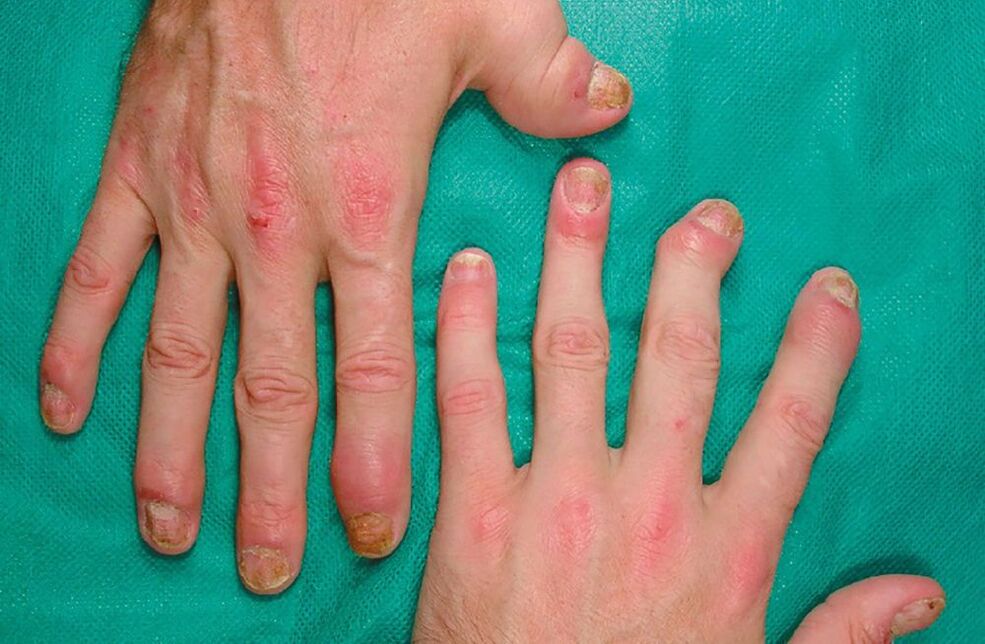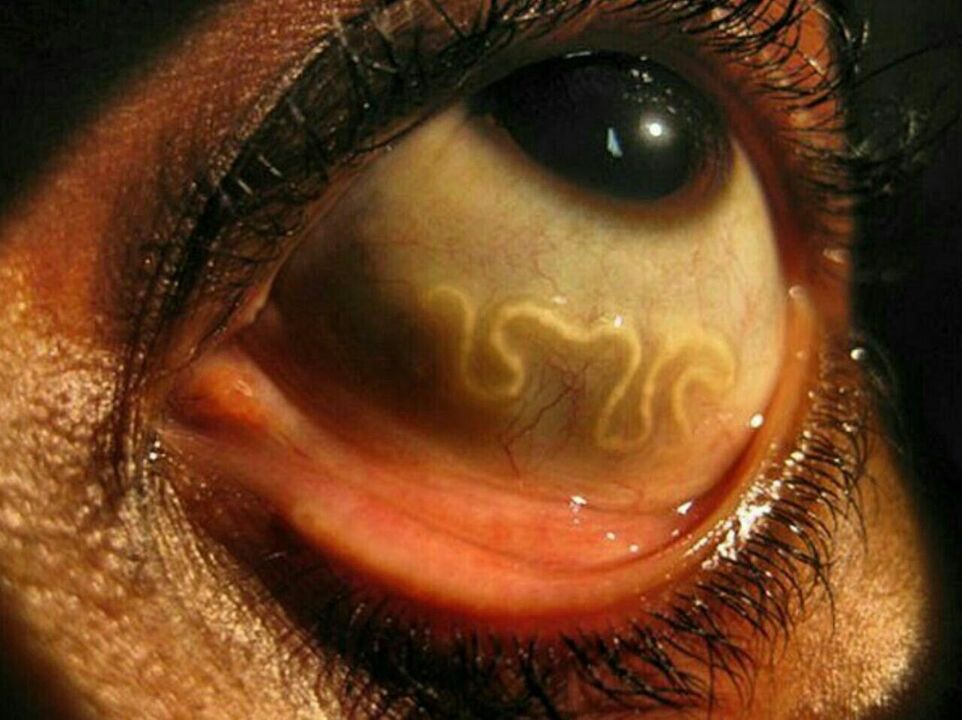
Helminthiasis is a common problem in certain categories of the population. Dumplings are usually parasitic in children, difhyllobothriasis can be diagnosed in people who often eat fish, and trichinosis is common among hunters.
The fact that human worms cause a number of diseases that appear to have nothing to do with helminthiasis is currently confirmed by several studies. In particular, there is a theory that helminthic diseases are associated with the development of oncological processes.
In addition, you should know that having helminths in your body does not mean that the patient will show symptoms of such an infection. Signs of their presence can be disguised as other diseases of the liver, gallbladder and gastrointestinal tract. As a result, a person can use different devices for a long time and does not detect the infection. And once the appropriate anthelmintic treatment regimen has been selected for the patient, the disease can be cured. Therefore, if you ask yourself, "What should I do if I have worms, how do I check for the presence of parasites and can I infect my loved ones? ", Don’t be afraid to see a doctor and get all the answers and also find out what you need. to do if you are infected with a worm.
In the article below, you will find answers to the question of what worms are, how dangerous such parasites are, and how not to become infected with different types of parasites. We will also talk about the general and specific signs of worm infection.
How can you get a helminth sample?

Helminth eggs can enter the human body in different ways. There are four main ways to get infected:
Biohelminthiasis. Worms are found in raw or poorly cooked meat as well as in fish. You can get lard, barbecue, dried fish, sushi, etc. consumption.
Geohelminthiasis. Ripe helminths in the soil and water enter the body. They find themselves in this environment and because human feces as well as animal feces get there as well. Infection also occurs when someone comes in contact with animals, such as constantly removing cat or dog feces, and when food is contaminated with fly eggs.
Contact. The most common worms, pinworms, spread from person to person. In this case, the risk of the disease is greatest.
Many parasites can enter the body when insects bite a person.
We are trying to find an answer to the question of what causes worms and how they spread, it must be taken into account that the main mode of infection with parasites is oral feces. That is, man simply swallows the eggs of worms when he eats, drinks water. In rare cases, worms occur after an infected insect bite in a person.
Infection with worms through the soil
With soil, sand, etc. After contact, you should not only wash your hands thoroughly, but also clean your nails. It is better for children to cut their nails very short. All vegetables grown in the ground should be washed very thoroughly and, if possible, boiled with boiling water.
Animals and flies
Wikipedia shows that worms can appear in the house and on the streets from pets - cats, dogs. There is a high risk of infection if children play with such animals. Therefore, you should take immediate action if there is a suspicion that worms have started in the cats. Symptoms and treatment of animal infection can be obtained from a veterinarian or watch the appropriate video online. In this way, any worm can appear in the body. Therefore, the answer to the question of whether they are transmitted from dog to human and whether they can be transmitted from a dog is clear: yes, it is possible.
Another carrier of helminths is flies. Initially, they can land on feces and animal waste, then fly in and land on food. As a result, intestinal worm eggs are spread and people cause worm diseases after infection.
How do worms spread from person to person?
How can you get worms and these parasites spread from person to person? The answer to this question is simple: if a female worm climbs out of the intestines at night in the baby’s dad, it can lay a large number of eggs near the anus - up to 5, 000. As a result, severe itching occurs, the baby itches, and the eggs fall on his hands. In addition, eggs fall from the baby’s hand onto clothes, bedding, and other objects that the child touches. It is clear how the worms spread: other children and adults are also infected with eggs, after which the small white needle worms multiply in the body. That is why it is very important to wash your hands before eating, returning from a public place.
Infection through water

There are a lot of parasite eggs in the open water bodies as well as in the well water. Therefore, users of such water should use a special bactericidal filter. It is also very important to boil the water that people drink and the food that is made from it. It is very dangerous to swallow water from reservoirs.
Speaking of helminthic invasion, it should be borne in mind that it is a disease that primarily affects children as they are very susceptible to helminthiasis. The situation is that in children the protective barriers have not yet developed to the same extent as in an adult, the acidity of the stomach is lower.
In addition, signs of the presence of worms in a child appear very often due to the fact that young children taste everything that is at hand as they learn the world. Therefore, parents very often experience symptoms of helminthic invasion in children, especially itching of the anus, poor appetite, cough in children during infection, and so on. Nevertheless, it is impossible to accustom the baby to strict adherence to hygiene rules. in the first years of his life. Therefore, at this time, the risk of infection is high for all family members.
Speaking of the egg worm - what it is and how to treat this disease, it must be remembered that worms do not multiply in the human body. Worms die in the human body over a period of time. For example, pinworms live for several weeks, wheelworms for about a year. Eggs that are deposited in the body by adult parasites are sure to leave the intestines - whether they leave the stool or baby skin, or near the anus, as in the case of fungal worms. When eggs are outside the human body, they mature in the external environment, then re-enter the human body and parasitize inside it again.
Because worms do not multiply in the body, a large number of worms can only be observed if re-infection occurs when the eggs re-enter the body through the mouth.
Therefore, if re-infection does not occur, the fungi living in the body will die within about 4 weeks. And if you follow all the preventative measures very carefully, you can get rid of the presence of worms without treatment. However, for children, following all these rules is a very difficult task.
Signs of helminths

When infected with parasites, some of the first symptoms of worms appear in humans. If you have an infection, you can find out more about the symptoms of the worms from a specialist. But in humans, some signs of worms are visible on their own.
So the most noticeable sign of infection with parasites is sharp weight loss. In addition, the patient's skin turns pale - this is how anemia manifests itself. At the time of onset, there are also signs of helminthic invasion - a person may appear exhausted and may become more tired.
Helmet samples cause itching in the anus if the intestines are infected. However, they can parasitize other organs - the lungs, liver, bladder, and even the arms or legs, and so on.
However, all of the symptoms of parasites in the human body listed above are just the first common sign of an infection that develops when the body is severely damaged by worms and allows you to recognize that something is wrong with your health. There are other, more specific symptoms of intestinal worm invasion in adults. The patient may perceive these as manifestations of other diseases. However, it is able to treat such diseases for a long time, without success, of course. This lasts until the exact cause of such symptoms is determined - helminthiasis. See the appropriate videos on the network for more details.
What are the symptoms of worms in adults and children?
Indigestion
If the parasites are localized in the intestines and not in other organs, the main signs in adults and children are a violation of digestive function. A person may be disturbed by persistent diarrhea or constipation, which may occasionally include nausea, vomiting, stomach pain, pain in the right hypochondria near the navel, and intestinal disorders. If the intestinal parasites get injured, bloating is often a concern.
All of these signs can be strong and weak, both long-term and intermittent. It all depends on the severity of the infection. There are worm-producing types of worms that cause persistent diarrhea. When large worms grow large (such as a tapeworm), they block the intestines and cause constipation.
General malaise, nervous system disorders
Worms live and excrete very large amounts of toxic substances, regardless of whether parasites live in a person’s blood, liver, or lungs. The more severe the infection, the more pronounced the signs of intoxication in the body, which adversely affect the nervous system.
This results in headaches, dizziness and nausea. Some people confuse such signs with the development of migraines and, as a result, drink painkillers.
Sometimes when infected with parasites, the temperature rises and the joint pain is disturbing. In addition, helminthic lesions cause a lack of vitamins and nutrients in the body. This phenomenon, as well as depression of the nervous system, leads to the manifestation of chronic fatigue syndrome. The patient feels tired, worried about drowsiness, a feeling of weakness in the body. When we talk about a child, he is naughty, constantly nervous. Toddlers have trouble sleeping, crying or screaming at night. School-age children have poor ability to learn due to inattention and fatigue.
Allergies and skin manifestations

Signs of worms Worms cause the skin to deteriorate. The toxins with which worms infect the body negatively affect its general condition and can trigger various reactions on the skin. Outbreaks result in the release of histamine from mast cells and the accumulation of fluid in the blood in the epidermis.
The same causes lead to allergic reactions. In particular, itching, red spots, acne, hives, as well as dry cough, allergic rhinitis, and bronchial asthma may occur. In addition, if infected, the nails may peel off, brittle hair may be observed and cracks may appear in the corners.
Impaired immunity and infectious diseases
As worms feed on the body, they excrete toxic waste products. Toxicity, a decrease in vitamins and minerals in the body leads to the fact that the immunity of the infected person is significantly impaired. As a result, the health of chronic diseases also deteriorates, and the inflammatory processes in the nasopharynx begin to interfere - sinusitis, stomatitis. Vulvovaginitis and bacterial vaginosis are possible in women and girls. There is evidence that inflammation of the appendages is possible with prolonged infection with needles. In this case, it is very important to detect their presence in time. Parasites in the liver also cause bad breath and persistent bad taste.
There is also an opinion that worms in humans cause snoring and gnashing of teeth at night. However, this relationship has not yet been proven.
Where do parasites live in the human body?

The types of parasites in the human body are determined depending on exactly where they live in the body. The determination of the presence of parasites and their removal from the body depends on the type.
translucent
These worms live mainly in the intestines and live in different parts of it. Hookworms, tapeworms, broad tapeworms, and other tapeworms are localized in the small intestine. In the small intestine lives dwarf tapeworms, pinworms, in the colon - whipworms. In total, there are about a hundred kinds of hollow parasites. Pictures and images can be found online.
fabric
These types of worms in humans do not live in the intestines but in the organs and tissues. There are varieties that live in the brain (cysticercosis), liver (echinococcosis), lungs (paragonimiasis), muscles, lymphatic system (filariasis), and other intestinal worms.
You can find out what worms are still in a person from a specialist.
The tapeworm is a species that is both a luminal and a tissue parasite, as it can infect any organ by moving in the blood in the early stages of their development. How to get rid of ascaris is the doctor who prescribes the treatment regimen for infection with such parasites.
You can find out what worms look like in humans by looking at a picture of the right type of parasite. The literature shows what worm eggs look like.
Signs of infection depending on the type
How worms appear and how dangerous they are depends on the type of parasites that live in the body and the intensity of the infection. In humans, signs of invasion can be seen after a few days. For example, if spindle worms appear, health deteriorates after 2-3 days. In patients infected with other types of helminths, the first signs are seen after 2-3 weeks. The incubation period for filariasis is 6-18 months.
Intestinal worms are dangerous in the sense that if there is a single individual in the gut, it is impossible to understand that a person is infected because they have no signs. Certain symptoms can only be bothersome if the worms are long (ascaris, broad tapeworm, etc. ) or if a severe infection has occurred. Almost all helminthiasis is accompanied by headache, fatigue, dizziness, and irritability.
What are worms, what are they called and what do they look like?
Pinworms (enterobiasis) - you can determine the presence of these types of intestinal worms by showing the main signs as well as the itching of the anus, which becomes more intense at night. If there are only a few lumps in the body, the itching may occur for several days, then go away and reappear after a few weeks. In the event of a severe invasion, the itching can be felt continuously.
Ascaris - which are signs of ascariasis, depends on the stage of development of these parasites. In the phase when the larvae migrate to the heart, lungs and other organs, weakness, subfebrile fever, coughing occurs, in which sputum is released, sometimes with pus and blood. If an X-ray is taken of the lungs at this time, volatile infiltrates may be seen, which will disappear later. Allergic reactions develop, and the blood test shows a high percentage of eosinophils. If the invasion is severe, bronchitis, pneumonia, asthma attacks are likely. People often wonder if there could be a cough if they are infected? Indeed, it is possible. You may also feel a sore throat. Signs of the second phase are associated with indigestion. Cylindrical worms produce substances that neutralize pepsin and trypsin, human digestive enzymes. As a result, the proteins are not digested and the patient loses a lot of weight. In ascariasis, complications sometimes occur - inflammation of the pancreas, obstructive jaundice, intestinal obstruction, appendicitis.
Ankylostomiasis, schistosomiasis, diphyllobothriasis, trichuriasis - such lesions develop anemia and beriberi. After all, the toxins secreted by helminths of these species significantly impair the intestinal microflora, provoking the development of dysbacteriosis.
Opisthorchiasis, fascioliasis, clonorchiasis are liver parasites. Consequences of invasion include icteric syndrome, enlarged liver, spleen, inflammation of the pancreas, cholecystocholangitis, neurological disorders, pathologies of the digestive system.
Trichinosis - the most common symptoms of this lesion are muscle pain, swelling of the eyelids, swelling of the face, fever.
Strongyloidiasis - causes tapeworms, the symptoms are very varied. Indigestion, allergies, biliary disorders, etc. may occur. sign.
Genitourinary schistosomiasis - manifests as diuretic disorders caused by flatworms. There is blood in the urine at the end of urination. In men, it can lead to abnormal prostate lesions, pathology of the seminal vesicles. In women, it causes consequences in the form of vaginal bleeding and genital lesions. Fibrosis may appear in the bladder.
Cestodosis - caused by tapeworms. These are bovine tapeworm, sheep brain, echinococcus, broad tapeworm, and so on. Signs of the disease include severe weight loss, weakness, and gastrointestinal dysfunction.
How to determine the presence of worms in a person?
If you are concerned about certain symptoms that indicate an infection, one is naturally concerned about how to understand that you have worm infections. Of course, only after visiting a doctor and performing all the necessary tests can you be sure if there is an infection or not. But there are other methods that are suitable for those who are interested in how they can find out there are worms. To do this, you need to monitor your health carefully and watch for changes in your body. After all, the presence of some pronounced symptoms provides an answer to the question of how to understand that there are worms.
Prevention of infection by worms

To prevent infection, you need to clearly understand the cause of the invasion, what is helminthiasis, what are the worms. It is important to take all preventative measures that significantly reduce the likelihood of infection.
- Fruits and vegetables should be washed thoroughly and boiled water poured over them.
- It is important to fight flies, cockroaches and mosquitoes - to keep track of where they come from, to destroy them.
- Cook meat and fish for at least 40-60 minutes.
- You only need to use your own hygiene items - towels, combs (to keep lice from spreading), etc.
- It is important to teach your baby to go immediately and wash his hands with soap and water before eating and after contact with all animals.
- If there are small and large animals in the house, they should be constantly given money to prevent worms. To find out which ones are, consult your veterinarian.
- It is important that the little ones only play with clean toys, the dropped pacifier or pacifier should be washed immediately.
- Kids need to get used to bad habits - breastfeeding fingers, biting their nails, taking different things in their mouths.
- The baby should have clean and short nails.
- To prevent re-infection of the dumplings, the baby should wear tight panties at night, which will prevent parasites and eggs from spreading on the bed.
- After washing, it is important to iron baby clothes.
- In the morning, panties should be changed and the child should be washed thoroughly.



































